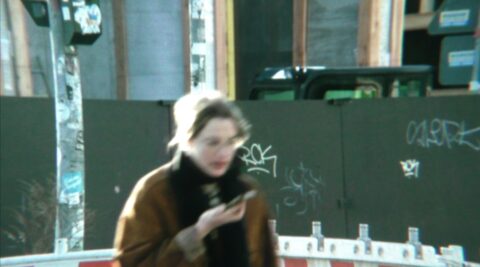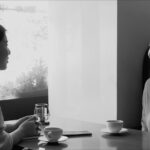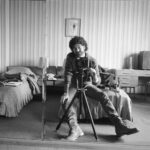Action Item (Paula Ďurinová, 2025) is a curious mid-length essay film, one filled with ambition and ideas, abstract images and concrete thoughts, crashing the anxieties of the individual against the rage (and potential solutions) of the collective. Constantly fascinating, especially in the way it tries to capture that which cannot be named, it is a powerful and personal work from auteur Ďurinová, who also worked as writer, co-editor, co-cinematographer and co-sound designer.
It starts with footage of a woman on a bike, accompanied by thoughtful narration. In this structuralist combination of Berlin footage — the iconic orange bins, the 20th-century buildings, trams and trains — with the use of voiceover, Chantal Akerman’s work News From Home (1975) instantly comes to mind. Here we have a similar mix of intimate moments with a panoramic city-feel.
As she narrates, the woman mentions that she is suffering from burnout, sending job application after job application, but with no luck. Then, when she is injured from a protest, she barely gives the pain any thought; her job search is all-consuming. This is then complemented by a flurry of abstract, hard-to-make-out images, with a new woman describing her struggles with depression. This continues for the first half of the movie, my favourite combination of voice and image, combining narration with footage of a fairground ride, the seats flitting in and out of view. It’s not only aesthetically pleasing, but it captures something quite profound about the human experience; the lurching sensation of flitting between mental states, caught in a ride where it can feel impossible to get off.
It’s a shame, however, that while the film does such a good job initially of attempting to portray the unportrayable — the murky maelstrom of internal thoughts and feelings — that the middle part drags with what is essentially a mental health seminar; far too plain a sequence considering the fascinating artistry that precded it.
Nonetheless, Action Item soars again when it escapes the individual curse and looks towards the collective; best captured by the way voices meld together in one clever, fascinating sequence. Because anxiety and depression are hard to pinpoint and give voice to, political issues — which always lurk in the background of everyday life — are easier to diagnose, and, perhaps, easier to solve… if the powers that be actually had any backbone.
One woman waiting for her visa to be approved describes how she is scared to go to protests in case this affects her application. It’s immediately obvious that she is describing the Palestine protests in Berlin, which have been brutally shut down by the long arm of German law.
While they are never mentioned by name, the particular footage chosen is instantly recognisable from social media; the keffiyehs draped around protesters are also unmistakable. I found it particularly fitting that the word “Palestine” is completely omitted, as the structure of everyday German life seeks to erase its very existence. Through the power of omission, the startling reality of the state — and how it contributes to an ongoing mental health crisis — is laid powerfully bare.
Redmond is the editor-in-chief of Journey Into Cinema.




